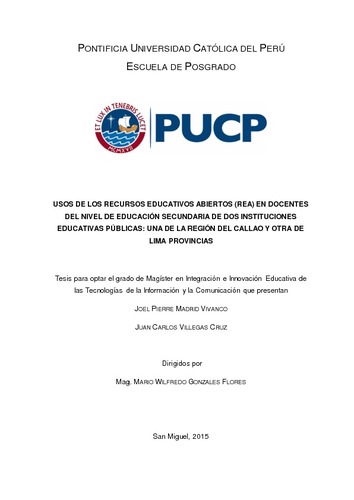Usos de los recursos educativo abiertos (REA) en docentes del nivel de educación secundaria de dos instituciones educativas públicas : una de la región del Callao y otra de Lima Provincias
Date
2016-05-02Author
Madrid Vivanco, Joel Pierre
Villegas Cruz, Juan Carlos
Metadata
Show full item recordAbstract
Los nuevos entornos escolares exigen innovar en los usos de los Recursos Educativos
Abiertos (REA), los cuales son elementos democráticos y de calidad porque facilitan la
labor pedagógica. Por ello, esta investigación responde al problema: ¿Cómo son utilizados
los REA por docentes del nivel de educación secundaria de una I.E. Pública de la Región
del Callao y otra de Lima Provincias?, con el objetivo de determinar los modos de uso de
los REA que realizan los docentes en ambas instituciones educativas.
El método de investigación es el estudio de casos múltiple desde un enfoque cualitativo en
un nivel descriptivo comparativo. El primer caso es los usos de los REA por los docentes
de la I.E. Pública "A" y el segundo, por los de la I.E.P. "B". En ambos casos, los docentes
conforman las unidades de análisis incrustadas, quienes respondieron una entrevista
semiestructurada complementada con un cuestionario mixto. Para la categorización se
utilizó matrices; para la codificación libre y axial, ATLAS.ti; para el análisis e
interpretación, la determinación de patrones y relaciones y; para la discusión, la
interpretación directa.
Las conclusiones muestran que los docentes del Caso 01 utilizan habitualmente y de modo
muy variado diferentes buscadores, repositorios, herramientas, software y otros recursos
online y offline de acceso libre, para presentar, editar, publicar y crear colaborativamente
contenidos y materiales educativos. Además, usan creativamente el blog para diseñar y
desarrollar sus sesiones de aprendizaje. Asimismo, ambos casos no utilizan eficientemente
las licencias de publicación abierta para compartir y difundir los REA en la Web.
Se recomienda a los investigadores utilizar métodos etnográficos digitales para investigar
exhaustivamente sobre creación y tipos de licenciamiento abierto de los REA, utilizados
en docentes. Asimismo, se sugiere promover activamente el uso de los REA en los
estudiantes. The new school environments require teachers to innovate in the uses of Open Educational
Resources (OER), which are democratic and quality elements because they facilitate the
pedagogical work. Therefore, this research responds the problem: How are OER used by
teachers of secondary level of one Public School from Callao Region and other from Lima
Provinces?, with the objective to determine the ways of uses of OER, which are carried out
by teachers in both schools.
The research method is the multiple case studies from a qualitative approach at a
comparative and descriptive level. The first case is the uses of OER by teachers of the
Public School "A" and; the second, by teacher of the Public School "B". In both cases,
teachers make up the embedded unit of analysis, who responded to a semi-structured
interview, which was supplemented by a mixed questionnaire. For categorization, it has
used matrices; for open and axial coding, ATLAS.ti; for analysis and interpretation, the
determination of patterns and relations and; for the discussion, the direct interpretation.
The conclusions show that teachers of Case 01 use commonly and in a wide variety of
ways, different search engines, repositories, tools, software and other online and offline
resources with open access to present, edit, publish and create collaboratively contents and
educational materials. In addition, they use the blog creatively to design and develop their
learning lessons. Also, both cases not use efficiently the open publication licenses to share
and spread the OER on the Web.
It is recommended researches to use digital ethnographic methods to investigate
thoroughly about creation and types of open licensing of OER, which are used by teachers.
Likewise, it is suggested promoting actively the use of OER in students.
Temas
Tecnología educativa.
Internet en la educación.
Aprendizaje abierto.
Internet en la educación.
Aprendizaje abierto.
Para optar el título de
Maestro en Integración e Innovación Educativa de las Tecnologías de la Información y la Comunicación (TIC)
The following license files are associated with this item:






